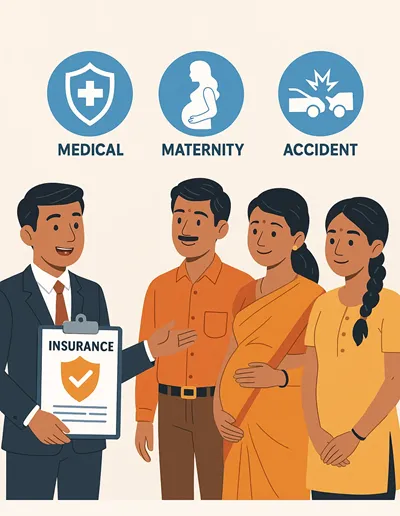
The Employees' State Insurance (ESI) Act, 1948 provides health and social security to workers in India's organised sector. Managed by the Employees' State Insurance Corporation (ESIC) under the Ministry of Labour & Employment, the Act ensures medical care, cash benefits during sickness, maternity benefits, compensation for work injuries, and support to dependents in case of death.
Key Features
- Applicability: Factories and establishments (shops, hotels, cinemas) with 10 or more employees.
- Contributions:
- Employee: 0.75% of wages
- Employer: 3.25% of wages
- Benefits include:
- Free medical treatment for insured employee + family
- Sickness benefit (wage during illness)
- Maternity benefit for women
- Disability benefit for work-related injuries
- Dependent's benefit / pension in case of death
- Funeral expenses
- Salary threshold: Employees drawing up to ₹21,000 per month (₹25,000 for persons with disabilities) are eligible.
- Permanent identity: Your ESI number stays even if you change jobs (if new job is covered).
FAQs – ESI Act, 1948
-
What is the ESI Act?
-
A social security law offering medical, cash, maternity, disability, and death-related benefits to insured workers.
-
Who manages the ESI Scheme?
-
The Employees' State Insurance Corporation (ESIC) under the central government.
-
Who are eligible beneficiaries?
-
Employees in factories/establishments with ≥10 workers, earning ≤ ₹21,000/month (or ₹25,000 for disabled persons).
-
What services fall under "medical benefit"?
-
Treatment at ESIC hospitals, dispensaries, and empanelled clinics for employees + dependents.
-
What is Sickness Benefit?
-
Up to 70% of wages paid for up to 91 days in a year if the insured is unfit to work.
-
What is the Maternity Benefit?
-
Insured women get 26 weeks paid leave for childbirth (full wage replacement).
-
What if I'm injured at work?
-
You're eligible for treatment plus compensation. In case of permanent disability, monthly benefits apply.
-
What is Dependent's Benefit?
-
If a worker dies due to employment injury, dependents get a monthly pension.
-
Are contract workers covered?
-
Yes, if they work in an establishment covered by ESI and satisfy wage limits.
-
How do I get treated under ESI?
-
Use your ESIC hospital, dispensary, or an empanelled private provider.
-
Do dependent family members get medical coverage?
-
Yes — spouse, children, and dependent parents are covered.
-
How to register/apply for ESI?
-
Employer registers you via ESIC's portal, and you receive an e-Pehchan (ESI) card.
-
If my salary exceeds ₹21,000 later, am I disqualified?
-
No, you're eligible until the completion of the contribution period.
-
Can I avail medical benefits after retirement?
-
Yes, through "Extended Medical Benefit" scheme, by paying a nominal fee.
-
What if a hospital is private—can I go there?
-
Only in an emergency (with authority approval) or if the hospital is empanelled by ESIC.
-
Can I keep using the same ESI number in new employment?
-
Yes, as long as the new employment is under ESI.
-
What is the importance of the ESI Scheme?
-
It offers essential financial and health security, reducing burden on workers during illness, maternity, or accidents.
-
Where is ESI hospitals and dispensaries located?
-
There are 160 ESIC hospitals and 1,502 dispensaries across India.
-
Does ESI apply in all states?
-
Yes, in states that have adopted the ESI scheme. Some states may have different implementation details.
-
Who should I complain to if benefits are denied?
-
Approach your ESIC regional or local office. You may also escalate to the ESIC grievance portal.
Add new comment